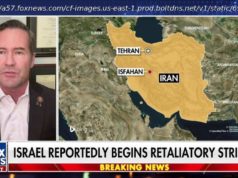This week was a very good week for peace in the Pacific. There is no need to overstate what was accomplished. North Korea ’s reclusive…
This week was a very good week for peace in the Pacific.
There is no need to overstate what was accomplished.
North Korea ’s reclusive leader Kim Jong-un traveled to Singapore to meet with President Trump .
The product of that meeting was a signed statement where North Korea pledges its commitment to denuclearization of the Korean Peninsula. The U. S. is willing to consider lifting sanctions against North Korea and has agreed to end “war games” in the South Pacific. Additionally, North Korea will begin taking concrete steps to ending its nuclear program.
In the meantime, the U. S. will consult with South Korea and Japan, and then begin principals-level negotiations on the specifics.
This is all positive. If the standard for success at the Trump-Kim Summit in Singapore this week was solving a problem spanning three decades in a three-hour meeting, then no one could have been successful.
Let us remember several key facts.
President Obama told President-elect Trump that the single most difficult challenge he will face is North Korea .
The North Korean regime has continued to build its nuclear program, with failed deterrence from the past three American presidents.
President Trump and his administration successfully negotiated several concessions ahead of the summit. North Korea ended ballistic missile tests and nuclear tests. North Korea reopened diplomatic discussions with South Korea with an eye toward formally ending the Korean War. North Korea released three American hostages.
President Trump has been more successful dealing with North Korea in one year than the U. S. has been in the last 30 years.
The summit is only an important first step.
But we must remember that six months ago, nuclear war seemed plausible, as the threats and rhetoric escalated. Those days now seem to be behind us.
The U. S. must continue to protect its own security, and our strong allies South Korea and Japan, and that requires steadfast leadership in holding the line on economic sanctions and U. S. troop deployment until the nuclear threat is verifiably and irreversibly neutralized.
The first step is for North Korea to inventory its entire nuclear program. Without this step, inspections are meaningless. Once that inventory is offered, the U. S. needs a system of snap inspections, with no sites exempted. As North Korea takes these meaningful steps, with South Korea also moving on a timeline toward denuclearization, the U. S. can commit to removing sanctions over time, considering scaling down U. S. troops in South Korea, and starting formal diplomatic relations with North Korea .
There are other important issues. Their medium range ballistic missile capability worries Japan. Japan has dozens of hostages being held in North Korea. Tens of thousands of North Koreans are held in prison camps, making it one of the worst human rights abusers in the world. Every one of these issues is important.
But the Trump administration is wise to focus their full and immediate attention on ending the nuclear threat.
The two sides are now publicly talking to each other. Wars are less likely when both sides are talking.
It took Ronald Reagan several years and five meetings with Mikhail Gorbachev to strike a deal with the Soviet Union.
A comprehensive agreement is complicated, and relationships take time to build.
While establishment analysts and bureaucrats have criticized President Trump at every step, the result up to this point should be reassuring to all Americans.
There is much work still to be done. The details here matter greatly.
But President Trump deserves credit for overseeing the maximum pressure campaign, which forced Chairman Kim to the table. Now that they have met, Mr. Trump has the kind of opportunity he relishes more than any other: Striking a deal.
• Matt Mackowiak is president of Austin, Texas, and Washington, D. C.-based Potomac Strategy Group. He’s a Republican consultant, a Bush administration and Bush-Cheney re-election campaign veteran and former press secretary to two U. S. senators. His “Mack on Politics” podcast is available on iTunes, Google Play, Stitcher and on WashingtonTimes.com.






